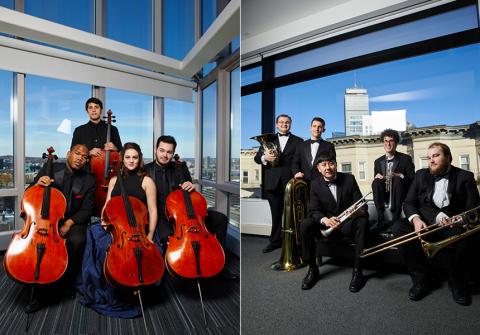Two Boston Conservatory Ensembles Make Their Washington, D.C. Debuts on the Kennedy Center’s Millennium Stage

Members of the cello quartet BoCoCelli, from left to right: Nathaniel Pasague Taylor, Jeremiah-Everard Barcus (standing), Elisa Rodriguez Sadaba, and William Laney. Members of the brass quartet No Strings Attached, from left to right: Brian Nowak, Austin Comerford, Moxi Li, Justin Ploskonka, and Joshua Thomas-Urlik.
Photos by Dave Green
Last month, two Boston Conservatory at Berklee ensembles stepped onto the national stage in a whirlwind two days in Washington, D.C.
On April 14, the cello quartet BoCoCelli and the brass quintet No Strings Attached performed at the John F. Kennedy Center for the Performing Arts, following a session the day before at the SiriusXM Radio headquarters, where they recorded a performance for the station’s Symphony Hall classical music channel.
“It was a big moment for them to be so well taken care of and to be presented in such a professional venue,” said Larry Isaacson, Boston Conservatory associate director of music and chair of the Brass Department. “They were pretty giddy all weekend.”
BoCoCelli cellists Jeremiah-Everard Barcus (M.M. '16, G.P.D. '18, cello), Nathaniel Pasague Taylor (B.M. '15, G.P.D. '17, cello), Elisa Rodriguez Sadaba (B.M. '17, cello), and William Laney (G.P.D. 17, cello) performed Tomaso Albinoni’s Adagio, selections from Gioachino Rossini’s The Barber of Seville, and two tango pieces by Astor Piazzolla, “Oblivion” and “La Muerte del Angel.” They closed their portion of the concert with a rousing rendition of Lalo Schifrin's Mission Impossible theme.
No Strings Attached brass players Brian Nowak (M.M. '18, horn), Austin Comerford (B.M. '17, brass), Moxi Li (G.P.D. '15, P.S.C. '18, trumpet), Justin Ploskonka (G.P.D. '18, trumpet), and Joshua Thomas-Urlik (B.M. '17, brass) performed Anthony Plog’s “Four Sketches for Brass Quintet” and J.S. Bach’s Contrapunctus IX from The Art of the Fugue. The quintet closed the concert with movements 1, 3, and 5 of Suite Americana by Enrique Crespo.
Although there were challenges in both venues—including the surprise of having close-ups of the musicians projected on a giant screen at the Kennedy Center—all rose to excellence. According to Rhonda Rider, chair of the String Department at Boston Conservatory, the students were “every bit the professionals we hope for, and then some,” and played with excellence and charm. “The players were on their game,” agreed Isaacson.
Their successful performances in such major venues meant a boost in confidence in their ability and stage presence. “Nerves, tensions, and excitement all ran high in preparation for this trip,” said Barcus of BoCoCelli. “Once it finally came, though, we all had nearly child-like fun on stage and it was almost relaxing once we started playing.”
A strong sense of camaraderie among the musicians added to the experience, several of the performers said. “Even though we aren't speaking with each other during the performance, from our first breath as a group to our last note, we are communicating. Our group sound reflects these personal relationships,” Comerford observed.
For these and other Boston Conservatory students, the merger with Berklee is widening horizons, as Berklee’s relationship with both the Kennedy Center and SiriusXM Radio go back many years. Past Berklee student performances at the center have included jazz, bluegrass, and other musical genres.
“For the students,” says Isaacson,“the world is a bigger place than it might have appeared to them a week earlier.”
Watch the two ensembles perform at the Kennedy Center’s Millennium Stage:
